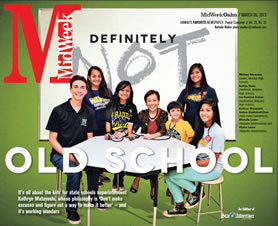Definitely Not Old School
The size of the department often has been discussed as a concern – Hawaii is the only state that has a statewide DOE, but Matayoshi believes we can use the girth of the organization to our advantage.
cover_2
“We need to know when to leverage size, and when to provide the autonomy at the local and community level,” says Matayoshi, “and that has not been clear enough to me. But we are getting there now, using our size strategically and then using our complex superintendents to bring decision-making closer to the school level, where it counts the most.”
Avoiding tinkering with what is outside her realm of expertise may be her strongest suit and could be the key to getting communities reinvested in their kids’ education.
“If the students, teachers and staff are saying a certain program is what they really want, then we are going to support it,” says Matayoshi. “Those programs are hugely successful. They are driven by need in the community, they are driven by desire on the part of the staff – that is when they are going to be successful. That is not a decision we make from the state level no matter how tremendous the program is, because not all schools are ready for it, and not all schools want it or need it.”
As the head of one of the largest employers in the state, having the CEO mentality is crucial to how to constantly better her product.
“It is a healthy thing to re-evaluate something you have been doing for a long time and ask ‘is it working?’ Find what is the most impactful for schools and spend our money on that,” Matayoshi says.
That is just what the DOE did with the RTTT money, knowing that as a one-time windfall, it was important for it to have a long-term impact.
“What we were very careful about when we applied was the ‘cliff effect,’ that once the money is gone, is everything going to fall off the cliff and disappear,” says Matayoshi. “Our philosophy was to invest in assets and systems that would continue beyond the grant: information systems and software.”
Another business decision facing her today is school consolidations or closures, and how to decide when the land values below the building outweigh the value of the school to the community.
“Any money that we could glean from property could go toward modernizing schools, and that is a good thing,” says Matayoshi, who also is open to looking at public/private partnerships to help open new schools. Updating our schools is a must. The average age of a school in this state is 65 years, and much spending is needed to update them to 21st century learning. So nothing is off the table for Matayoshi, but only if it is the right thing for the students.
“People are attached to their community school for good reason,” says Matayoshi, “so it has got to be a holistic look at what is going to be offered to the children from an educational perspective if you close a school, but always in the balance is what is good for the kids.”
Not all her work is being done on administration. This April, the DOE rolls out the first statewide implementation of the ACT College and Career Readiness System for grades 8-11. It is set up to help students starting to determine their inclinations find out what they should be studying to help turn those into their reality.
“The ACT checks their aptitudes and is accepted at most higher-education facilities,” says Matayoshi. “You don’t pigeonhole kids. This is really about finding out what they are interested in really early and opening up those opportunities. Kids don’t know that much about the adult world and the jobs that are out there. They might not even know they could be a lawyer, a vet or a carpenter. If you don’t have exposure to them, you won’t know if they might be something you would like to do.”
Yet despite all the new changes being implemented, Matayoshi knows that none of it will matter if the moms and dads of this generation don’t buy in as well.
“Parents can get involved with the school and really talk with your kids about what is happening, what they are learning, go to open houses and other events,” says Matayoshi, a graduate of Hilo High. “I think when parents see what the teachers are actually doing, how dedicated they are, parents are going to get excited about what is happening in school.
“It is very different than when I went to school. The kids are just amazing. The opportunities they have – music, theatre, sports and the science activities – it is different and really cool place to be.”







